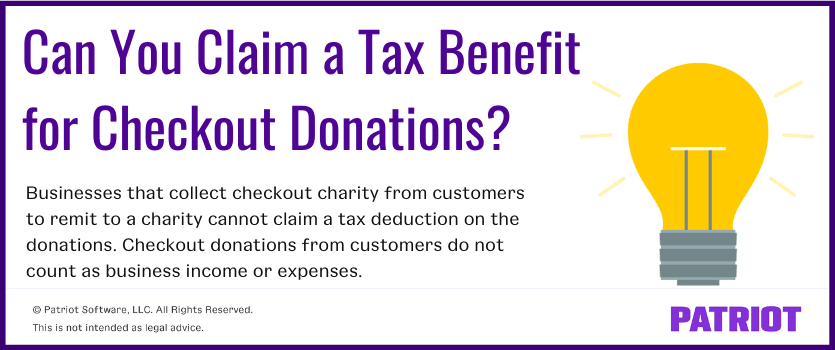You’re at the checkout counter, wallet in hand, preparing to pay for your purchase. But before you can, the cashier asks if you’d like to round up or make a donation for charity. Sound familiar? If so, you’re part of the millions of consumers hit with a request for checkout donations.
And if your business makes checkout charity collections, you’ve likely been on the other side of this situation. Or, maybe you’ve never done it, but you’re interested in partnering with a charity and asking customers for donations at the point of sale.
Whether you’re asking for round-up donations or other checkout donations, you may have some questions. From tax breaks to pros and cons, read on for the scoop.
Checkout donations: 6 Things to know
Point of sale fundraising campaigns contribute hundreds of millions of dollars in charitable donations each year. For many charities, checkout donations are a lifeline.
Interested in partnering with a charity? Here are six things to know.
1. There are different types of checkout donations
No two point of sale donation programs are the same. You might work out how you’ll approach checkout charity with the charity you’re collecting for. Or, you may make the decisions within your business.
Before implementing a checkout donation program, consider:
- What you’ll ask customers for (e.g., rounding up their total to the nearest dollar, asking for a flat amount, etc.)
- Whether you’ll provide something in exchange for their donation (e.g., a reusable shopping bag)
- If you want to contribute a portion of your sales to charity (e.g., 15% of all purchases go to charity)
2. You don’t get to claim a tax benefit for customer donations
Do companies get tax breaks for donating to charity? This boils down to who’s really making the donation: You (the business collecting and remitting the money) or the customer (the person donating the money).
Think of checkout donations like sales tax. When it comes to sales tax, you’re the middleman who collects the amount from customers and remits it to the tax agency. Likewise, you’re the middleman who collects donations and remits them to the charity.
As the collector and not the donator, you cannot claim a tax benefit on checkout donations from customers. Why? Round-up donations do not count as business income or expenses. In fact, customers would be the ones able to take a tax deduction, if they wanted, using their receipt with the donation amount as proof.
When you receive a checkout donation for a charity, do not include the amount in your business income (it’s not for you!). And, do not include it as a business expense (you’re not the one paying it!).

3. You can claim a tax benefit if you donate part of your sales to charity
Now, let’s say you pledge a portion of your sales to a charity. Can you get small business donations tax deductions in that case? If you donate some of your business proceeds to a charity, you may be eligible to claim a charitable tax deduction.
Certain small business charitable donations are tax-deductible. To be eligible, your business donations must go to a qualifying nonprofit (i.e., one with 501(c)(3) status). Keep in mind that there are limits to how much you can deduct.
If you donate a portion of your sales to a charity partner and collect checkout donations from customers, only claim a deduction on the amount your business donates.
4. Checkout donations can make your business look good
Why should you consider asking customers for donations at the point of sale for your favorite charity? On top of helping raise money for your charity partner, asking customers to donate can make your business look good.
Even though customers are the ones making the donations, partnering with charities can help your business come across as generous, compassionate, and caring. Not to mention, companies associated with giving back enjoy increased brand loyalty from customers.
5. When it comes to collecting donations, strong records are a must
You collect $0.86 for round-up donations from sale #1, $0.22 from sale #2, $0.94 from sale #3, and so on. After a while, tracking these small donations can get taxing and confusing.
To avoid incorrect records and remittances, you need a reliable recordkeeping system. That way, you can track information like:
- How much money each customer gives
- Dates customers donate
- The total amount you’re remitting to charity
- The date you remit donations to charity
Consider using accounting software to help you keep track of transactions, including business income and liabilities, like sales tax and checkout donations. And, use a separate account to store collected donations until you remit them to the charity.
6. Not all customers like checkout charity
Checkout donations can be a great way to 1) Gather donations for a good cause and 2) Give your business a reputation of generosity. But be forewarned: Not all customers like checkout charity.
In one Harvard Business Review (HBR) study, researchers found that customers dislike point of sale solicitations for charity. Why? Some customers perceive checkout donations as a “violation of their social contract with the retailer—a contract built on the principle of reciprocity.”
To help counter potential backlash associated with checkout charity requests, HBR suggests:
- Rewarding customers
- Making the process as easy as possible (e.g., use round-up donations)
- Being transparent about the charity




